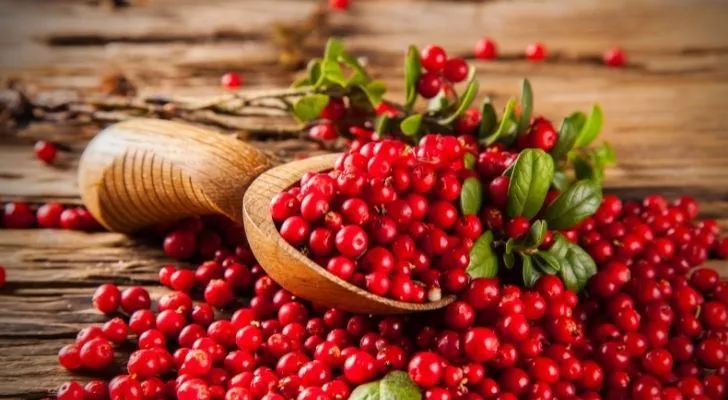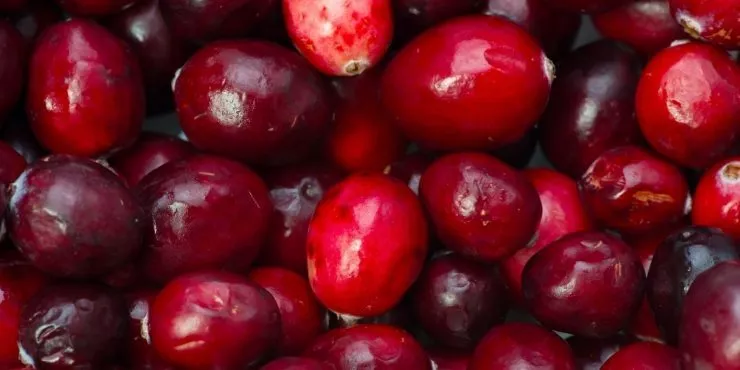As part of a balanced and healthy diet, we have to eat various fruits and vegetables to make sure we get all the vitamins and minerals needed.
Cranberries are an important fruit for our body’s health, and consuming them promotes certain health benefits.
Cranberries are native to North America, but many products such as cranberry juice and supplements are available worldwide.
Here are six health benefits of eating cranberries that you should know.
Cranberries contain over 15 beneficial vitamins and minerals.

Cranberries are full of many vitamins, minerals, and antioxidants.
To have a healthy, functioning human body, we need daily doses of vitamins and minerals.
Cranberries contain vitamins A, B-1, B-1, B-3, B-6, C, E, and K.
They also contain protein, calcium, magnesium, potassium, iron, zinc, sodium, and phosphorous.
They are also well known for having the antioxidant called proanthocyanidins (PACs).
Antioxidants are important for the human body as they help break down and fight against unwanted cells.
They can help prevent the development of certain long-term illnesses.

Cranberries contain many elements that the body needs to function and remain healthy, but recent studies have shown how these elements can also slow down the long-term effects of illness.
Pre-clinical studies carried out in 2016 tested certain elements of cranberries against cancerous cells.
These experiments demonstrated that certain compounds in cranberries could trigger the death of or slow down cancerous cells’ growth.
Although very few tests have been carried out on humans, there is hope for cranberries to be a beneficial fruit to consume alongside relevant treatment.
Cranberries can slow the effects or postpone chronic age-related afflictions like memory loss and aging of the skin.
Eating cranberries can decrease blood pressure.

Evidence shows that some of the polyphenols found in cranberries can be very beneficial for reducing things like systolic blood pressure.
When eaten regularly, it is also possible that they can help reduce your risk of developing cardiovascular disease (CVD).
Research has shown that certain elements of cranberry supplements can help maintain a good cholesterol level and improve levels of high-density lipoprotein (HDL).
A study monitored 78 overweight participants that consumed a single daily dose of a low-calorie cranberry beverage, and the results were positive.
All participants showed improvement in regulation of blood sugar and increased levels of HDL.
Cranberries contain elements that can help improve immune function.

Elements of cranberries can protect your immune system by offering support to your gut.
Their antioxidant qualities help the human body to get rid of unwanted cells that enter our bodies mostly through food.
When we are digesting and breaking down food often, molecules known as free radicals are produced by the body.
Antioxidants help the body to get rid of these unwanted molecules and protect cells from harmful bacteria.
Cranberries’ high levels of vitamin C help the human body to keep its immune system boosted to fight off coughs and colds.
Cranberries can help with allergies.

For most allergies, we take antihistamines and sometimes anti-inflammatory medication.
Cranberries contain a compound called quercetin, which is thought to help reduce inflammation.
If you experience inflammation as a response to an allergy, then it is possible that by consuming cranberries, you can help reduce the outcomes of an allergic reaction in the future.
They are known for lowering the risk of Urinary Tract Infection (UTI).

Cranberries are native to North America, and historically Native Americans would consume cranberries to help with bladder and kidney disease.
The main antioxidant proanthocyanidins (PACS), which are found in cranberries, stop certain bacteria from attaching themselves to the urinary tract walls.
This reduces the risk of developing a UTI. However, there needs to be a high concentration of this antioxidant.
Therefore drinking cranberry juice will not be as effective as taking a cranberry capsule for treatment.
This also applies to oral health as the PACS will help reduce bacteria attaching to teeth.
In Conclusion
When consumed in large quantities, cranberries can cause some health risks like most things.
It’s advised that you consult a doctor if you want to increase or alter your cranberry intake or if you want to start taking cranberry supplements.
Cranberries are full of many vitamins and minerals that are vital to keeping a healthy body and, in small doses, are a great benefit to your health.












